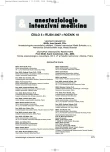-
Medical journals
- Career
Perioperative beta-blockade
Authors: K. Škarvan
Authors‘ workplace: Departement Anästhesie, Universitätsspital Basel, Švýcarsko
Published in: Anest. intenziv. Med., 18, 2007, č. 5, s. 286-295
Category: Anaesthesiology - Review Article
Overview
Adverse cardiac outcome continues to be an important cause of perioperative morbidity and mortality in non-cardiac surgery. This is related to the high prevalence of coronary artery disease in the ageing surgical population. Beta-blockers have proven useful and efficatious in the treatment of perioperative myocardial ischaemia and arrhytmias. After early studies had suggested that a prophylactic perioperative beta-blockade could also reduce perioperative and long-term morbidity and mortality, the administration of beta-blockers to patients with coronary artery disease or its risk factors undergoing major non-cardiac surgery is now recommended in published guidelines. However, a recent meta-analysis as well as several new studies did not confirm the postulated beneficial effects of perioperative beta-blockade and gave rise to a lively discussion. Until the conclusions of the ongoing large trials in the next two years and better evidence are known, the decision to start prophylactic perioperative beta-blockade remains at the discretion of the attending physicians. This decision should be based on the patient’s risk, type of surgery and a consideration of potential interactions and side-effects of the selected beta-blocker.
Key words:
beta-blockers – non-cardiac surgery – cardiac risk – complications – evidence
Labels
Anaesthesiology, Resuscitation and Inten Intensive Care Medicine
Article was published inAnaesthesiology and Intensive Care Medicine

2007 Issue 5-
All articles in this issue
- Cardiogenic shock and its current management options
- Professor Peter J. Safar, MD (1924–2003): unbelievable life career
- Fast-track and ultra fast-track cardiac anaesthesia – postoperative pain and other parameters observation
- Fibrinolysis and its management in cardiac surgery
- Perioperative beta-blockade
- Do beta-blockers still have their role in myocardial protection?
- Anaesthesiology and Intensive Care Medicine
- Journal archive
- Current issue
- Online only
- About the journal
Most read in this issue- Cardiogenic shock and its current management options
- Professor Peter J. Safar, MD (1924–2003): unbelievable life career
- Fibrinolysis and its management in cardiac surgery
- Fast-track and ultra fast-track cardiac anaesthesia – postoperative pain and other parameters observation
Login#ADS_BOTTOM_SCRIPTS#Forgotten passwordEnter the email address that you registered with. We will send you instructions on how to set a new password.
- Career

